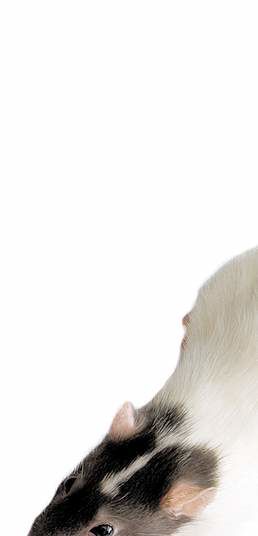Research uncovers empathy in rats
Published 4:00 am Monday, December 12, 2011

- Thinkstock
CHICAGO — As charges of greed and self-interest fly in these hyper-partisan political times, humans might do well to look to rats for lessons in kindness and caring.
A University of Chicago experiment to determine how much empathy rats have for each other had some surprising results, which were published Friday in the research journal Science.
In laboratory studies, a rat was restrained in a small cage that could be opened only from the outside. A second rat, seeing the predicament of the trapped rat, immediately began tirelessly trying to find a way to free his fellow rat.
Eventually, the second rat taught itself to open the cage door, freeing the restrained rat, leading to what strongly resembled a triumphal celebration between the two. Even when faced with an alternative choice of chocolate chips, the free rat would not be deterred from helping its caged fellow rat.
As simple as it sounds, the experiment is being hailed as a new paradigm that will help scientists trace the development of emotion in mammals back through the evolutionary tree.
Previously, scientists thought that empathy and pro-social behavior to help others were unique to humans, said Jeffrey Mogil, a researcher at McGill University in Canada who has done similar studies on mice.
“This study shows the roots of human empathy didn’t just appear but evolved,” said Mogil, who was not connected with the University of Chicago study. “It is very impressive, showing really robust and conclusive evidence that rats show pro-social (helping) behavior. You can argue why the rats are doing it, but you can’t argue anymore that the rats are doing it.”
Higher forms of empathy
The experiment is the work of University of Chicago doctoral student Inbal Ben-Ami Bartal; her adviser, Jean Decety, a professor of psychology and psychiatry who studies human empathy; and Peggy Mason, a neurobiology professor who studies pain modulation and relief.
Decety said it has been proved in past studies that rats also experience a primitive form of empathy called emotional contagion — the sort of thing where if one baby in a group of babies begins to cry, they all break out in tears.
“Ben-Ami came to my lab to do her Ph.D. with an idea of using an animal model to study higher forms of empathy,” said Decety, who enlisted Mason for a study that wound up taking three years.
The team first paired rats of the same gender for three weeks.
Then they placed one of the pair in a small, Plexiglas restraint cage, locked by a door that could only be opened from the outside. The cage was placed in a larger enclosure where the rat’s partner roamed free.
By means the researchers aren’t sure of, the caged rat seemed to communicate its distress to the freed rat, and the freed rat sprang into action.
“The free rat jumps on the restraining cage immediately, pushing it, biting at it, touching its nose and whiskers through the openings in the restraining cage with those of the trapped rat,” Mason said. “Clearly it wants to help out the trapped rat.”
After about six days, the free rat would accidentally open the door and from then on quickly learned how to deliberately open it, and then excitedly interact with its now-free partner as they raced around the enclosure.
“I can’t say that they are celebrating,” said Mason. “But sure looks like a celebration.”
Because rats love chocolate, in some experiments the scientists placed two restraint cages in an enclosure with a rat that already knew how to open the cage door. One cage contained a rat, the other five chocolate chips.
“We wanted to ask how much the free rat valued being able to liberate the caged rat,” Mason said. “They like their chocolate chips, but the free rat would open both cages in no particular order.
“The free (rat) could have done all manner of things to monopolize the chocolate chips, but on average it always left one and a half chocolate chips for the liberated rat. That’s impressive — a hard thing for primates to do — showing it puts equal value on chocolate and freeing its partner.”
Eventually rats that did not know each other were used, and the free rat still worked hard to liberate the stranger from the cage.






